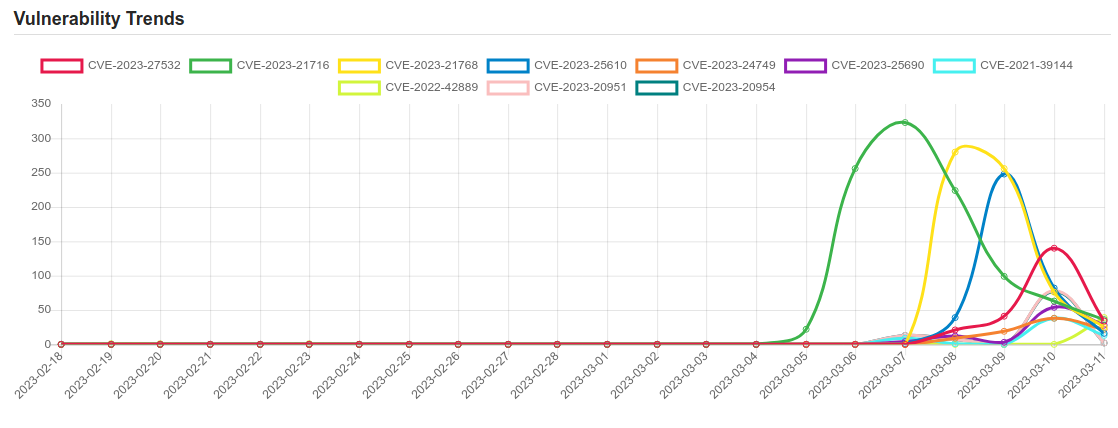Daily Vulnerability Trends: Sun Mar 12 2023

| CVE NAME | CVE Description |
| CVE-2023-25690 | Some mod_proxy configurations on Apache HTTP Server versions 2.4.0 through 2.4.55 allow a HTTP Request Smuggling attack. Configurations are affected when mod_proxy is enabled along with some form of RewriteRule or ProxyPassMatch in which a non-specific pattern matches some portion of the user-supplied request-target (URL) data and is then re-inserted into the proxied request-target using variable substitution. For example, something like: RewriteEngine on RewriteRule “^/here/(.*)” “http://example.com:8080/elsewhere?$1”; [P] ProxyPassReverse /here/ http://example.com:8080/ Request splitting/smuggling could result in bypass of access controls in the proxy server, proxying unintended URLs to existing origin servers, and cache poisoning. Users are recommended to update to at least version 2.4.56 of Apache HTTP Server. |
| CVE-2021-39144 | XStream is a simple library to serialize objects to XML and back again. In affected versions this vulnerability may allow a remote attacker has sufficient rights to execute commands of the host only by manipulating the processed input stream. No user is affected, who followed the recommendation to setup XStream’s security framework with a whitelist limited to the minimal required types. XStream 1.4.18 uses no longer a blacklist by default, since it cannot be secured for general purpose. |
| CVE-2022-42889 | Apache Commons Text performs variable interpolation, allowing properties to be dynamically evaluated and expanded. The standard format for interpolation is “${prefix:name}”, where “prefix” is used to locate an instance of org.apache.commons.text.lookup.StringLookup that performs the interpolation. Starting with version 1.5 and continuing through 1.9, the set of default Lookup instances included interpolators that could result in arbitrary code execution or contact with remote servers. These lookups are: – “script” – execute expressions using the JVM script execution engine (javax.script) – “dns” – resolve dns records – “url” – load values from urls, including from remote servers Applications using the interpolation defaults in the affected versions may be vulnerable to remote code execution or unintentional contact with remote servers if untrusted configuration values are used. Users are recommended to upgrade to Apache Commons Text 1.10.0, which disables the problematic interpolators by default. |
| CVE-2023-20951 | No description provided |
| CVE-2023-20954 | No description provided |
| CVE-2020-5741 | Deserialization of Untrusted Data in Plex Media Server on Windows allows a remote, authenticated attacker to execute arbitrary Python code. |
| CVE-2022-33891 | The Apache Spark UI offers the possibility to enable ACLs via the configuration option spark.acls.enable. With an authentication filter, this checks whether a user has access permissions to view or modify the application. If ACLs are enabled, a code path in HttpSecurityFilter can allow someone to perform impersonation by providing an arbitrary user name. A malicious user might then be able to reach a permission check function that will ultimately build a Unix shell command based on their input, and execute it. This will result in arbitrary shell command execution as the user Spark is currently running as. This affects Apache Spark versions 3.0.3 and earlier, versions 3.1.1 to 3.1.2, and versions 3.2.0 to 3.2.1. |
| CVE-2021-43789 | PrestaShop is an Open Source e-commerce web application. Versions of PrestaShop prior to 1.7.8.2 are vulnerable to blind SQL injection using search filters with `orderBy` and `sortOrder` parameters. The problem is fixed in version 1.7.8.2. |
| CVE-2022-36413 | No description provided |
| CVE-2023-26489 | wasmtime is a fast and secure runtime for WebAssembly. In affected versions wasmtime’s code generator, Cranelift, has a bug on x86_64 targets where address-mode computation mistakenly would calculate a 35-bit effective address instead of WebAssembly’s defined 33-bit effective address. This bug means that, with default codegen settings, a wasm-controlled load/store operation could read/write addresses up to 35 bits away from the base of linear memory. Due to this bug, however, addresses up to `0xffffffff * 8 + 0x7ffffffc = 36507222004 = ~34G` bytes away from the base of linear memory are possible from guest code. This means that the virtual memory 6G away from the base of linear memory up to ~34G away can be read/written by a malicious module. A guest module can, without the knowledge of the embedder, read/write memory in this region. The memory may belong to other WebAssembly instances when using the pooling allocator, for example. Affected embedders are recommended to analyze preexisting wasm modules to see if they’re affected by the incorrect codegen rules and possibly correlate that with an anomalous number of traps during historical execution to locate possibly suspicious modules. The specific bug in Cranelift’s x86_64 backend is that a WebAssembly address which is left-shifted by a constant amount from 1 to 3 will get folded into x86_64’s addressing modes which perform shifts. For example `(i32.load (i32.shl (local.get 0) (i32.const 3)))` loads from the WebAssembly address `$local0 << 3`. When translated to Cranelift the `$local0 << 3` computation, a 32-bit value, is zero-extended to a 64-bit value and then added to the base address of linear memory. Cranelift would generate an instruction of the form `movl (%base, %local0, 8), %dst` which calculates `%base + %local0 << 3`. The bug here, however, is that the address computation happens with 64-bit values, where the `$local0 << 3` computation was supposed to be truncated to a a 32-bit value. This means that `%local0`, which can use up to 32-bits for an address, gets 3 extra bits of address space to be accessible via this `movl` instruction. The fix in Cranelift is to remove the erroneous lowering rules in the backend which handle these zero-extended expression. The above example is then translated to `movl %local0, %temp; shl $3, %temp; movl (%base, %temp), %dst` which correctly truncates the intermediate computation of `%local0 << 3` to 32-bits inside the `%temp` register which is then added to the `%base` value. Wasmtime version 4.0.1, 5.0.1, and 6.0.1 have been released and have all been patched to no longer contain the erroneous lowering rules. While updating Wasmtime is recommended, there are a number of possible workarounds that embedders can employ to mitigate this issue if updating is not possible. Note that none of these workarounds are on-by-default and require explicit configuration: 1. The `Config::static_memory_maximum_size(0)` option can be used to force all accesses to linear memory to be explicitly bounds-checked. This will perform a bounds check separately from the address-mode computation which correctly calculates the effective address of a load/store. Note that this can have a large impact on the execution performance of WebAssembly modules. 2. The `Config::static_memory_guard_size(1 << 36)` option can be used to greatly increase the guard pages placed after linear memory. This will guarantee that memory accesses up-to-34G away are guaranteed to be semantically correct by reserving unmapped memory for the instance. Note that this reserves a very large amount of virtual memory per-instances and can greatly reduce the maximum number of concurrent instances being run. 3. If using a non-x86_64 host is possible, then that will also work around this bug. This bug does not affect Wasmtime's or Cranelift's AArch64 backend, for example. |
| CVE-2022-30190 | Microsoft Windows Support Diagnostic Tool (MSDT) Remote Code Execution Vulnerability. |
| CVE-2022-35914 | /vendor/htmlawed/htmlawed/htmLawedTest.php in the htmlawed module for GLPI through 10.0.2 allows PHP code injection. |
| CVE-2023-25136 | OpenSSH server (sshd) 9.1 introduced a double-free vulnerability during options.kex_algorithms handling. This is fixed in OpenSSH 9.2. The double free can be leveraged, by an unauthenticated remote attacker in the default configuration, to jump to any location in the sshd address space. One third-party report states “remote code execution is theoretically possible.” |
| CVE-2022-28810 | Zoho ManageEngine ADSelfService Plus before build 6122 allows a remote authenticated administrator to execute arbitrary operating OS commands as SYSTEM via the policy custom script feature. Due to the use of a default administrator password, attackers may be able to abuse this functionality with minimal effort. Additionally, a remote and partially authenticated attacker may be able to inject arbitrary commands into the custom script due to an unsanitized password field. |
| CVE-2023-27898 | Jenkins 2.270 through 2.393 (both inclusive), LTS 2.277.1 through 2.375.3 (both inclusive) does not escape the Jenkins version a plugin depends on when rendering the error message stating its incompatibility with the current version of Jenkins, resulting in a stored cross-site scripting (XSS) vulnerability exploitable by attackers able to provide plugins to the configured update sites and have this message shown by Jenkins instances. |
A considerable amount of time and effort goes into maintaining this website, creating backend automation and creating new features and content for you to make actionable intelligence decisions. Everyone that supports the site helps enable new functionality.
If you like the site, please support us on Patreon using the button below

To keep up to date follow us on the below channels.





